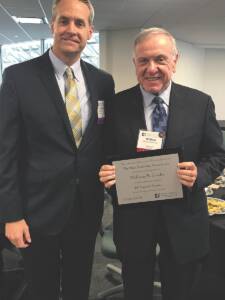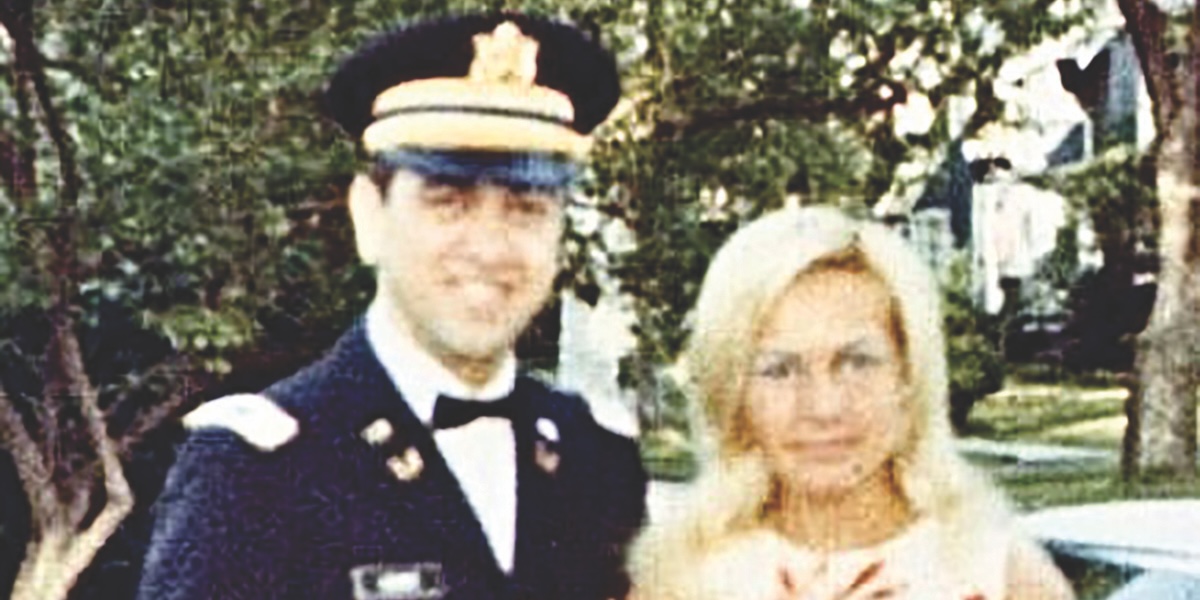DEFENDING THE DEFENDERS
William B. Leahy Ohio State ’62
I am not a flag-waving, showy patriot, but make no mistake — I am a patriot. I am gratified that I did my duty, even at a time when soldiers were treated with contempt. Like many of my fellow soldiers of that era, I performed that duty not as an endorsement of war but as repayment of a debt to our beloved country.
Is my tale one of woe, resentment? Quite the contrary. I appreciate all my time in the military, even my time as an enlisted man, which taught me how the “other half” lives. I feel as if I did my small bit to assure justice in the military courts.
 It was October 1968, the height of the Vietnam War. Darlene and I were married in June. I had passed the Ohio Bar exam and was working as a litigator at a Columbus, Ohio, law firm. Darlene was teaching elementary school, and we had recently received the exciting news that she was pregnant. Upon graduation from law school, Selective Service reclassified me 1-A. (Translation: “You will be in the Army soon, young man.”)
It was October 1968, the height of the Vietnam War. Darlene and I were married in June. I had passed the Ohio Bar exam and was working as a litigator at a Columbus, Ohio, law firm. Darlene was teaching elementary school, and we had recently received the exciting news that she was pregnant. Upon graduation from law school, Selective Service reclassified me 1-A. (Translation: “You will be in the Army soon, young man.”)
One Friday after work, I returned to our apartment feeling mellow and happy. I opened the door and Darlene said, “It came today.” My draft notice. It was not a surprise.
On November 2 — my 25th birthday — I was sworn in as an Ohio lawyer and shortly thereafter was inducted into the U.S. Army at Ft. Hayes, Columbus. My comrades and I were put on a commercial flight to Columbia, South Carolina, thereupon to be taken to Ft. Jackson. The dinner on the plane was lobster and filet mignon. No joke. I’ve told many people that induction into the U.S. Army is the closest you will ever come to being kidnapped by aliens!
I spent Thanksgiving on KP duty.
After being processed at Ft. Jackson, some of us were transported to Ft. Gordon, Georgia — near Augusta — for basic training. We were the lowest of the low, privates in the U.S. Army. We slept in coal-heated World War II vintage barracks. The food was surprisingly good. We did not play golf at Augusta National.
Movies portray drill instructor sergeants (DI) as sadistic lunatics. Don’t believe it. Yes, they are tough guys and demanding. They wear Smokey the Bear hats. They say things like “You’ll wish you had died as a child,” and “Your — is grass and I’m a lawn mower.” I never saw a DI lay a hand on a trooper. They teach survival skills, and they’re very good at it. I listened intently, knowing their lessons might save my life.
While in basic training, I applied for direct commission as a Captain in the U.S. Army Judge Advocate General’s Corps (think: “A Few Good Men”). If I was rejected, my future would be uncertain. I could be an 11 Bravo infantry man in ’Nam. If accepted, I would go from Private to Captain in one day and could still go to Vietnam.
One day while I was on KP mopping the floor, I heard our company executive officer tell a first lieutenant, “See that private mopping the floor? He’s going to outrank you pretty soon.” The first lieutenant was incredulous. I was silent — often a good choice in the Army.
Upon completion of basic training, I was assigned to a desk job as a law clerk at the Ft. Gordon Staff Judge Advocate Office (law office) while awaiting decision on my application for direct commission. Finally, I learned that I was accepted into the JAGC.
Yes, I went from Private to Captain in one day.
I was immediately sent to the U.S. Army JAGC School on the grounds of the University of Virginia and then to permanent duty at Ft. Knox, Kentucky. Darlene was too far along in her pregnancy to join me. I missed her immensely.
Our first child, Heather Ann Leahy, had the grace to enter the world in a civilian hospital in Toledo while I was on leave between assignments in July 1969. The sweat-drenched obstetrician emerged smiling to inquire, “How would you like a girl?” He was smoking a cigarette! Different times.
I was never assigned to Vietnam. There is seemingly no rationale behind why the military sends some and not others. A friend from basic training with a master’s in social work was assigned as a door gunner in Vietnam (the guys who sit in a helicopter with a rifle to allow a safe landing to evacuate the wounded). My cherished chapter brothers and friends, Craig Stewart ’61 and Tim Simon ’61 went, too, as did many JAGC officer colleagues and combat officers who were neighbors on post.
In the JAGC, initially, I defended soldiers charged with crimes we would call misdemeanors. Thereafter, I became a prosecutor of felony cases. Ft. Knox was teeming with soldiers, including some who had been criminals in civilian life.
Our group tried everything from murder on down. I prosecuted a soldier charged with rape, for which the Army was demanding the death penalty. (He entered a plea of guilty in return for a 35-year prison sentence.) I prosecuted a career non-commissioned officer (NCO) for bigamy and fraud (obtaining military spouse benefits for two women). We tried the entire range of military offenses, including lengthy, extended AWOLs, desertion, disobedience, even “fragging” (attempting to kill an officer with a fragmentation grenade).
As a specially assigned defense counsel, I successfully defended a First Lieutenant on a bribery charge and a “full bird” Colonel on a charge of stealing weapons from the armory.
The public perception that military criminal trials are “kangaroo courts” is simply incorrect. In some ways, they are fairer than civilian criminal trials. If you don’t believe me, F. Lee Bailey agrees. I tried very hard to be not just a good lawyer in the military but a good officer. I took pride in that.
I had other interesting assignments. I was the legal advisor to Brigadier General George Patton (son of the famous WWII General) on a Board of Inquiry; I lectured 200 National Guardsmen on the use of deadly force shortly after the Kent State tragedy; and I lectured the U.S. Treasury guards at the Ft. Knox Bullion Depository on arrest and apprehension (I actually was allowed to take a peek at the gold).
So how do I reflect on my four years, three months of service?
Outstanding, as military people like to say.
I received invaluable trial experience as a lawyer, experience I never could have received in civilian life. This enhanced my resume, enabling me to join a top-notch Cleveland law firm upon discharge. I met remarkable people and made friends that I hold dear to this day … the best of the best.
Darlene and I often say that our times at Ft. Knox are among our happiest memories. Heather still remembers as a toddler crawling up on mounted tanks and sitting behind the wheel of a jeep on blocks.
Although my contribution was meagre compared to the sacrifices made by so many others, some of whom still reside in VA hospitals and some of whom are immortalized on the Vietnam memorial wall in Washington, D.C., I am proud to have served my country.
I didn’t enter the Army voluntarily, but I emerged a better man.
Bill has been married to his wife, Darlene, for 56 years. They live in Shaker Heights, Ohio. They have four children and five grandchildren.

